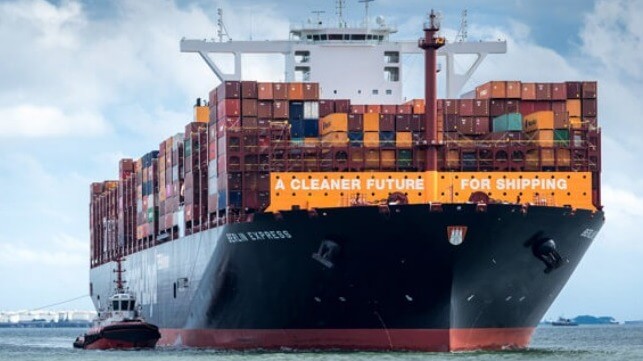Hapag and Gasum Set Bio-LNG Supply Contract for Rotterdam-Singapore Route

A unique supply agreement has been set for the Nordic energy company Gasum to provide Hapag-Lloyd with bio-LNG to fuel containerships sailing between Singapore and Rotterdam in 2025 and 2026. The supply that will meet Hapag’s obligation under its contract with the cargo owners project, ZEMBA, is also seen as a key stepping stone toward the carrier’s goal to be net-zero carbon by 2045.
Bio-LNG is growing in favor among the shipping industry as an alternative that can reduce greenhouse gas emissions by up to 90 percent. Hapag will have one of the first large-scale supply contracts while Maersk also recently said it is also working on securing offtake agreements for liquified bio-methane (bio-LNG) as part of its fleet modernization program to ensure that its planned new dual-fuel gas vessels provide greenhouse gas emissions reductions in this decade. Bio-LNG is gaining due to the concerns for supply and cost of methanol as a marine fuel.
Hapag-Lloyd was announced in April 2024 as the winner of the first buyers’ agreement from ZEMBA (Zero Emission Maritime Buyers Alliance). The first-of-its-kind buyers alliance unites major shippers including Amazon, Patagonia, Bauhaus, New Balance, Nike, REI, and others which collectively agreed to purchase over one billion TEU miles on the route between Singapore and Rotterdam in 2025 and 2026. Hapag as the winner of the tender has agreed to provide an independently certified and exclusive waste-based biomethane service that can achieve at least a 90 percent reduction in greenhouse gases on a lifecycle basis relative to fossil fuel-powered shipping.
ZEMBA’s concept was by pooling demand they believe they can spur the fuel transition in shipping. Carriers bid for the contract assured of volumes and demand to help support the cost of the effort.
Gasum will bunker Hapag-Lloyd’s containerships with a total amount of 20,000 mt of bio-LNG during 2025-2026. The vessel will be operating on the Singapore-Rotterdam route effectively launching a long-distance green corridor.
“This agreement demonstrates that the green transition in the maritime transport sector is picking up speed”, said Jacob Granqvist, VP of Maritime for Gasum. “We need all-hands-on-deck to drive the effort, and using bio-LNG to fuel maritime transports is an effective way to reduce emissions already today, rather than in a distant future.”
Gasum’s liquefied biomethane (bio-LNG) fuel is produced from waste feedstocks such as biowaste, sewage sludge, manure, and other industrial and agricultural side streams. On average, it will provide 90 percent lower emissions when compared with fossil fuel and the company highlights it can be used in all the same applications as natural gas, including as a road and maritime transport fuel and as energy for industry. The residual solids and liquids created in the biogas production process are also further processed and used as, for example, fertilizers in agriculture or raw material in industrial processes.
Gasum produces biogas in its own 17 biogas plants in Finland and Sweden and has supply contracts from other partners. The company says its goal is to offer seven TWh of renewable gas by 2027, including biomethane and e-methane. Achieving this goal would result in a combined CO2 reduction of 1.8 million tonnes per year.
No comments:
Post a Comment